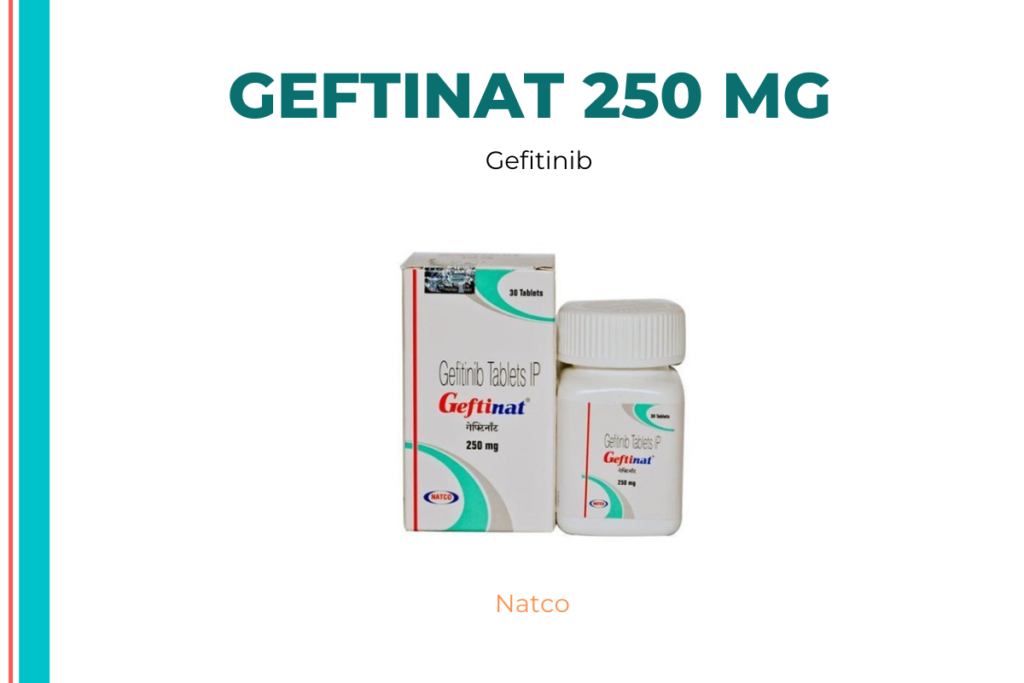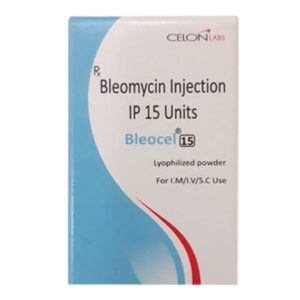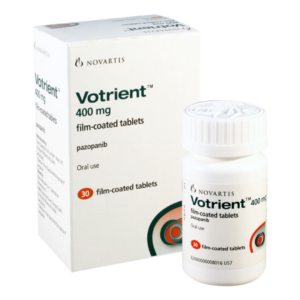Geftinat 250 mg
Geftinat 250mg belongs to the ‘anti-cancer’ drug class, which is largely used to treat lung cancer. The uncontrolled proliferation of abnormal cells in one or both lungs is referred to as lung cancer. These aberrant cells do not perform the duties of regular lung cells and do not mature into healthy lung tissue. Lung cells develop uncontrollably in this condition, and if not caught early enough, it can spread to other areas of the body, including the brain.
Geftinat 250mg contains the drug ‘Gefitinib,’ which belongs to the kinase inhibitor class of drugs. It works by inhibiting the action of an aberrant protein that causes malignant cells to multiply. It halts the spread of malignant cells in this way.
Follow your doctor’s instructions for taking Geftinat 250mg. It is recommended that you take Geftinat 250mg for as long as your doctor has prescribed it following a thorough examination of your medical condition. You may have itching or a rash on your skin, acne, nail issues, vomiting, diarrhoea, and a loss of appetite. The majority of these adverse effects do not necessitate medical treatment and will subside with time. However, if you are experiencing these adverse effects on a regular basis, you should consult your doctor.
Continue taking Geftinat 250mg for as long as your doctor recommends to effectively treat your problem. If you are pregnant or trying to become pregnant, avoid taking Geftinat 250mg because it might cause significant birth abnormalities. Breastfeeding moms should avoid taking Geftinat 250mg because it goes into breast milk and may provide a risk to the baby. Because elderly individuals are more sensitive to medicine, they can change the dosage to fit their needs. Alcohol should not be used while taking Geftinat 250mg because it may cause dizziness.
Geftinat 250mg uses
Non-small cell lung cancer (NSCLC) is a type of lung cancer

Medicinal Advantages
Patients suffering from non-small cell lung cancer should take Geftinat 250mg. This form of cancer has a high proclivity for spreading to other places of the body. Geftinat 250mg is a drug that travels through the circulation and kills malignant cells in the lungs and other parts of the body. Geftinat 250mg is a tyrosine kinase inhibitor (TKI) that prevents malignant cells from growing and spreading uncontrollably. It works by inhibiting the action of an aberrant protein that causes malignant cells to multiply. When a new healthy cell is produced, it goes through the normal maturation process. Because diseased cells divide more quickly, Geftinat 250mg targets cancerous cells and inhibits Tyrosine Kinase enzymes (responsible for causing cancer). It also reduces the blood flow to malignant tumors, slowing the tumor’s growth. Geftinat 250mg inhibits the generation, spread, and growth of malignant cells in the body in this way.
Use Instructions
Geftinat 250mg should be taken on an empty stomach at least one or two hours before a meal. Geftinat 250mg tablets should be consumed whole with plenty of water; chewing or breaking the tablet is not recommended. To swallow the drug, do not drink anything other than water. It is recommended that you have your blood pressure checked on a regular basis.
Store in a cool, dry location away from direct sunlight.
Geftinat 250mg Side Effects
Acne
Skin that is parched
Nausea
Vomiting
Diarrhea
Appetite loss.
Itching or a rash on the skin
Drug Recommendations
If you have liver or kidney disease, eye issues, breathing problems, or are taking a blood thinner like warfarin, tell your doctor. It is recommended that you inform the medical expert doing the procedure about all of the medications you are taking before undergoing any surgery. As a side effect of Gefitinib, some people may have diarrhoea, so drink plenty of water and notify your doctor if this happens. If you experience any serious Gefitinib side effects, such as shortness of breath, a worsening cough, or other eye issues, contact your doctor right once. Regular blood tests are required to ensure that this treatment is working well for you. Because Gefitinib can cause diarrhoea, avoid high-fiber meals, raw fruits, cereals, and vegetables, and drink plenty of water.
Interactions Between Drugs
Gefitinib may interact with other anti-cancer medications (Sorafenib and Paclitaxel), antibiotics (Neomycin), anti-seizure medications (carbamazepine, phenytoin), nonsteroidal anti-inflammatory drugs (NSAIDs) (ibuprofen, naproxen), blood thinners (warfarin), and antacids (Omeprazole).
Gefitinib may cause diarrhea, so avoid high fiber foods, raw fruits, cereals, and vegetables, and drink plenty of water.
Drug-Illness Interaction: If you have liver or renal disease, eye issues, or breathing problems, tell your doctor.
Safety Suggestions
ALCOHOL
When using Gefitinib, you should avoid drinking alcohol because it can increase the chance of adverse effects such dizziness, drowsiness, and problems concentrating.
PREGNANCY
Gefitinib is not recommended for usage during pregnancy. Before initiating treatment with this drug, a woman must have a negative pregnancy test. It is preferable to use effective birth control techniques to avoid pregnancy while taking Gefitinib or for at least 6 months following the last dose.
BREAST FEEDING
Breastfeeding moms should avoid using gefitinib since it goes into breast milk and poses a risk to the baby.
DRIVING
It is unknown whether Gefitinib will impair your driving skills. Only drive if you are physically fit and mentally alert. You should not drive or operate any machinery or vehicles if you feel drowsy after taking this prescription.
LIVER
IN People WITH LIVER DISEASE Gefitinib should be used with caution in patients who have liver disease. The dose may be adjusted by the doctor depending on the patient’s medical condition.
KIDNEY
Patients with renal illness who take gefitinib as prescribed by their doctor are safe. The dose may be adjusted by the doctor depending on the patient’s medical condition.
No habit formation
Advice on Diet and Lifestyle
Physical activity improves muscle strength, reduces fatigue, aids weight loss, and provides strength. Gentle activities such as walking or swimming for 20-30 minutes would be beneficial.
Yoga and other relaxation techniques can help you improve your physical and mental health while also lowering your stress levels.
Maintain a healthy weight by engaging in low-strain workouts on a regular basis and consuming nutritious foods.
Get enough sleep because it helps to improve your health, mental abilities, and attention.
Meditating, reading novels, taking a nice bubble bath, or listening to calming music are all good ways to de-stress.
Antioxidant-rich foods include berries, spinach, kidney beans, dark chocolate, and so on.
Fiber-rich foods promote better digestion. Beans, peas, lentils, whole grains, nuts, and seeds are among them.
Avoid smoking and consuming alcoholic beverages.
Recommendations
It is recommended that you do not take an antacid or stomach acid-reducing medicine within 6 hours after taking Gefitinib because doing so may make the medicine less effective.
Your doctor may recommend a periodic liver function test to evaluate your liver’s function while you’re on Gefitinib.
Additional Information: This item is non-refundable.
Concerns of Patients
Lung cancer develops when cells in the lungs begin to grow out of control. Non-small cell lung cancer is the most frequent type of lung cancer (NSCLC). It occurs when the cells that make up the lung’s lining begin to develop out of control. Smokers are at a higher risk of lung cancer. A persistent cough that is accompanied by shortness of breath is a typical sign of NSCLC. Lung cancer cells spread and proliferate by traveling via the bloodstream to other parts of the body.
FAQs
Most kinds of lung cancer double in size in three to six months. Lung cancer took a long time to grow to the point where it could be detected using an X-ray.
A cough that lasts for a long period and grows worse over time is the most common indication of lung cancer. A patient’s cough may occasionally contain blood. Coughing and chest pain are also signs of lung cancer.
Gefitinib may interfere with a woman’s ability to conceive. As a result, if you have such a plan, you should inform your doctor.
It is recommended that you do not take an antacid or stomach acid-reducing medicine within 6 hours after taking Gefitinib because doing so may make the medicine less effective.
Gefitinib is safe to consume if you have diabetes. However, only take Gefitinib after consulting with a doctor, as the dose may need to be adjusted based on the patient’s condition.
Gefitinib is not recommended for usage during pregnancy. Before initiating treatment with this drug, a woman must have a negative pregnancy test. It is preferable to use effective birth control techniques to avoid pregnancy while taking Gefitinib or for at least 6 months following the last dose.
In circumstances where a person is experiencing a major side effect that is affecting their quality of life, gefitinib should be discontinued. Otherwise, you should continue to take Gefitinib until your doctor tells you to stop.








Leave a Reply
You must be logged in to post a comment.